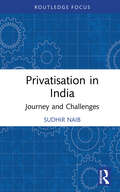- Table View
- List View
Private or Socialistic Forestry?: Forest Transition in Finland vs. Deforestation in the Tropics
by Matti Palo Erkki LehtoWhile deforestation continues at an alarming rate around the world, discussions on the range of underlying causes continue. The premise is that studying successful transitions from deforestation to sustainable forestry ex post in Finland can provide novel insights into how deforestation in the tropics might be reduced in the future. Our fundamental question here is why Finland succeeded to stop deforestation for a century ago and why not the same is feasible in the contemporary tropical countries? This book presents a novel integrated theory within which this case study on Finland and contemporary modeling of underlying causes of tropical deforestation are developed. Finland remains the world's second largest net exporter of forest products, while maintaining the highest forest cover in Europe. A transition from deforestation to sustainable industrial forestry took place in Finland during the first part of the 20th century. The underlying causes of this transition are compared via our theory with deforestation in 74 contemporary tropical countries. Both appear similar and support our theory. The interaction of public policies and market institutions has appeared to be critical during this transition. The study's findings suggest that private forest ownership with a continuous increase in the real value of forests and alleviation of poverty under non-corruptive conditions has been a necessary, but not a sufficient, condition for this transition. In a parallel way public policies have also proved to be a necessary, but not sufficient, condition in this transition. The conclusion is that socialistic forestry along with corruption is artificially maintaining too low values in the tropical forests. The opportunity cost of sustainable forestry remains too high and deforestation by extensification of agriculture therefore continues. The prevailing socialistic forestry with dominating public forest ownership is by purpose maintaining administratively set low stumpage prices leading to low value of forests, wide corruption and continuous forest degradation and deforestation. An effective remedy - to raise the value of forests - is found to be within forestry.
Private-Banking-Angebote regionaler Genossenschaftsbanken: Wirtschaftlichkeitsanalyse anhand eines Business Case (Edition Bankmagazin)
by Patrick PertlDieses Buch befasst sich mit dem Private Banking in Regionalbanken und hier insbesondere in Genossenschaftsbanken. Es stellt die aktuellen Entwicklungen und Rahmenparameter im Private Banking zusammenfassend dar. Zudem zeigt es insbesondere für kleinere Genossenschaftsbanken Konzepte für den Auf-/Ausbau eines Private-Banking-Segments auf. Die grundsätzliche Idee für dieses Buch entwickelte sich im Rahmen meiner Masterarbeit im Jahr 2015. Das Buch selbst entstand inhaltlich danach und berücksichtigt Entwicklungen bis Anfang des Jahres 2019. In dieser Zeit haben sich für Banken insbesondere durch die anhaltende Niedrigzinspolitik der Europäischen Zentralbank einige Herausforderungen ergeben, die insbesondere zu sinkenden Einnahmen aus dem Konditionsbeitrag geführt haben. Neben dem Firmenkundengeschäft stellt das Private Banking einen der Bereiche in Regionalbanken dar, der aktuell steigende Einnahmen zu verzeichnen hat. Das wiederum führt dazu, dass sich immer mehr auch kleinere Banken verstärkt mit diesem Themenfeld beschäftigen.
Private-Sector Organizations
by Robert S. Kaplan David P. NortonThis chapter documents three case studies of strategy maps in private-sector companies Northwestern Mutual, Media General, and Volvofinans. These organizations use the strategy map to clarify strategy at the execution level; communicate strategy to employees; align business units, departments, functions, and initiatives; and focus management processes.
Privatisation and Development: Theory, Policy and Evidence
by Claude V. ChangThe book interrogates privatisation in terms of its effectiveness vis-à-vis its stated goals and more fundamentally in terms of its success in delivering economic development. It investigates why privatisation was successful in the UK and other OECD countries and why it has not met with equal success in developing countries. In this regard, it further examines the policy prescriptions of the IMF and World Bank in relation to the conceptualised benefits and theoretical assumptions underlying these supposed benefits. The author assesses the extent to which culture and customs, indeed the mode of production, stand in determinate relationship to the goals, techniques and outcome of the process. Furthermore, Chang examines the degree to which socioeconomic and moral consequences of privatisation have been ignored in pursuit of the ideological imperative implicit in the Washington Consensus. Hence, the book contributes to the reflective thought that must necessarily be part of theory validation, and provides the basis for a balanced and empirically-valid theory of privatisation.
Privatisation and Financial Collapse in the Nuclear Industry: The Origins and Causes of the British Energy Crisis of 2002 (Routledge Studies In Business Organizations And Networks Ser. #Vol. 43)
by Simon TaylorA timely contribution and incisive analysis, this is the story of the British experiment in privatizing the nuclear power industry and its subsequent financial collapse. It tells how the UK's pioneering role in nuclear power led to bad technology choices, a badly flawed restructuring of the electricity industry and the end of government support for
Privatisation and Liberalisation in European Telecommunications: Comparing Britain, the Netherlands and France (Routledge Studies in International Business and the World Economy)
by Willem HulsinkThis book combines a detailed, sector-specific study of comparative telecommunications regimes set in the context of the EC, with an extensive historical and empirical analysis of individual policy management and change as experienced by three diverse regulatory cultures, namely, Britain, the Netherlands and France. By adopting a comprehensive analytical framework based on far-reaching literature, the author explores a wide-range of theories, addressing key issues at the forefront of contemporary political and academic debate as: Do nation states matter in the globalizing telecommunications industry? Does the common challenge of techno-global telecommunications restructuring elicit different national responses? What is the significance of a single-speed or multi-speed Europe in implementing telecommunications governance regimes?
Privatisation in Developing Countries (Routledge Library Editions: Public Enterprise and Privatization)
by V. V. RamanadhamIt is widely felt that the public sector in many developing countries is too large, and that privatisation would benefit both the users of individual services and the economy in general. However, enthusiasm for private enterprise solutions is not always matched by the requisite financial and economic technology. The sort of schemes appropriate for a country like China, with its highly planned public sector economy, and Jordan, with its dominant private sector, are unlikely to be the same. Privatisation without reference to these differences will be an economic, administrative and organisational chaos rather than a panacea. Originally published in 1989, this book starts with an analysis on the concept, rationale and fundamental issues of privatisation, with reference to both developed and developing countries. There follows a critical scrutiny of the privatisation programmes of countries in Asia, Africa and Latin America, written by contributors actively concerned with public enterprise and privatisation at the time. It examines the role of international aid agencies, including the World Bank, in promoting the schemes and it details the positive impact of them as well as their pitfalls. These country accounts are complemented by a concluding chapter giving an overview of the substantial issues raised.
Privatisation in India: Challenging economic orthodoxy (India in the Modern World)
by T.T. Ram MohanOver the past decade India has been undertaking a programme of economic reform, and at the same time the economy has been growing at a high rate. As part of the reform programme, and in line with prevailing economic thinking, India has been privatising its large, ungainly public sector. One assumption underlying this programme is the dogma that public sector enterprises are doomed to inefficiency, and that competitive market forces can be relied on to make firms more efficient once they are privatised. But is this really true? Combining rigorous data analysis with case studies to provide a balanced evaluation of the process of deregulation and privatisation within the overall context of economic reforms, the author demonstrates, remarkably, that, contrary to the prevailing view, private sector firms do not outperform public sector firms across all sectors. He also shows that revenue-raising considerations have weighed more heavily with the government than efficiency objectives. Overall, this study of the reform process in India, with its unique longstanding mix of private and public sectors, will be of great interest to all those studying reform and transition worldwide.
Privatisation in India: Journey and Challenges (Routledge Focus on Business and Management)
by Sudhir NaibThis book is a comprehensive work which incisively analyses, from a theoretically informed perspective, crucial aspects of India’s journey from partial divestiture to privatisation, accompanied by case studies of enterprises being privatised in FY 2022. Naib begins with the economic role of the state followed by theoretical and empirical evidence on the state versus private ownership in the first two chapters. Next, an overview of public sector in India including the New Public Sector Enterprise Policy for Atmanirbhar Bharat-2021 is discussed, before a broader examination of the global experience with privatisation is done. Naib then goes on to explore India’s journey from partial divestiture to privatisation from 1991 to 2021 in four time slots based on the political party in power. The book also looks at big ticket privatisation and asset monetisation proposed in FY 2022. Many criticised the design of National Monetisation Plan as it may lead to concentration of wealth, increasing inequalities, asset stripping, and consumers paying higher charges. The book closes by presenting six instances of big-ticket privatisations ranging from airlines, airports, banks, insurance, as well as industries such as petroleum and telecoms. The book’s timely data and analysis of key developments will interest researchers in the fields of divestiture and privatisation in India.
Privatisation in Ireland
by D�nal Palcic Eoin ReevesThis book analyzes privatization in Ireland, a European economy that has experienced rapidly changing fortunes over the last thirty years. It examines the effects of privatization in terms of corporate performance, public finances and the distributional aspects of privatization including the impact on employment and share ownership.
Privatisation in the UK (Routledge Library Editions: Public Enterprise and Privatization)
by V. V. RamanadhamThe Conservative’s privatisation programme was one of the most ambitious aspects of their attempt to redraft the political and economic map of the United Kingdom. Originally published in 1988, this book explores the processes of privatisation from a variety of standpoints. Its contributors include academics, enterprise executives and government officials, many of whom had been closely involved in the programme. Fiscal, legal and social aspects of privatisation are explored but the book treats the subject as more than an immediate political issue and takes the opportunity to discuss the success – or otherwise – of public enterprise and to explore the implication of the UK experience for other countries which have an interest in privatisation.
Privatisation: A Global Perspective (Routledge Library Editions: Public Enterprise And Privatization Ser.)
by V. V. RamanadhamFirst published in 1993. Routledge is an imprint of Taylor & Francis, an informa company.
Privatised Law Reform: A History Of Patent Law Through Private Legislation, 1620-1907
by Phillip JohnsonIn the history of British patent law, the role of Parliament is often side-lined. This is largely due to the raft of failed or timid attempts at patent law reform. Yet there was another way of seeking change. By the end of the nineteenth century, private legislation had become a mechanism or testing ground for more general law reforms. The evolution of the law had essentially been privatised and was handled in the committee rooms in Westminster. This is known in relation to many great industrial movements such as the creating of railways, canals and roads, or political movements such as the powers and duties of local authorities, but it has thus far been largely ignored in the development of patent law. This book addresses this shortfall and examines how private legislation played an important role in the birth of modern patent law.
Privatisering in Pakistan: Uitdagingen en respons
by Shahid Hussain RajaZonder technische termen en geschreven in een gemakkelijk te lezen taal, is dit korte boek bedoeld voor algemeen lezerspubliek, met name voor degenen die moeten weten wat er gebeurt is met de privatiserings-inspanningen in Pakistan nadat de Pakistan Muslim League in 2013, een bedrijfsvriendelijk regime, aan de macht kwamen. Dit korte e-book is een uitgebreide versie van mijn artikel "Privatisering in Pakistan" dat ik schreef kort na mijn pensionering als Federaal Secretaris van de regering van Pakistan, ministerie van privatisering in 2012. Het trok veel aandacht, wat me ertoe aanzette een volwaardig boek te schrijven over de geschiedenis van privatisering in Pakistan en andere gerelateerde kwesties, inclusief de vooruitzichten en de uitdagingen waarmee het op korte tot middellange termijn zal geconfronteerd worden. Behoefte aan privatisering Over het algemeen heeft de staat een of meer van de volgende privatiseringsdoelstellingen; 1. versterking van de privé sector. Dit was de drijfveer achter de eerste generatie van privatiseringen die in 1960 in Pakistan werd uitgevoerd, toen de staat fabrieken bouwde in strategische sectoren en deze tegen zeer nominale tarieven overdroeg aan de zakenlieden die terughoudend waren om in deze sectoren te investeren vanwege een gebrek aan vereiste middelen tot hun beschikking en hoge risico's. 2. Verbetering van de efficiëntie en dienstverlening van staatsbedrijven, al dan niet winstgevend, door het stimulerings- en beloningsmechanisme in te voeren van de privé sector die kapitaal, technologie en betere beheerspraktijken zou inbrengen. Pakistan privatiseerde het grootste deel van zijn staatsbedrijven tijdens de privatisering van de tweede generatie in de jaren tachtig en negentig. 3. Elimineren / verminderen van de enorme overheidssubsidies die worden gegeven aan staatsbedrijven die voortdurend verliezen lijden, maar die niet kunnen worden gesloten vanweg
Privatización en Pakistán
by Shahid Hussain RajaAunque Pakistán haya estado llevando a cabo la privatización de empresas estatales por más de 50 años, la privatización de cualquier empresa siempre genera discusiones acaloradas, normalmente centradas alrededor de cuatro problemas/necesidades y beneficios, intereses de los empleados, bienestar del consumidor y transparencia. Mientras que sus autores lo apoyan por reducir subsidios estatales y lograr ganancias por eficiencia, sus adversarios se oponen por sacrificar bienestar público, “vender la plata familiar” (deshacerse de algo valioso en búsqueda de una ventaja, a pesar de que sea conveniente resguardarlo), y crear monopolios privados. Incluso aquellos, que son no partidistas en este debate, aconsejan precaución y argumentan que este proceso debería ser estrictamente evitado en el caso de monopolios naturales y de activos estratégicos como recursos naturales. Dejando de lado el debate, el hecho que la privatización es una parte integrante de la agenda general de la liberación y desregulación económica. Abriendo la economía a la competición, la liberación económica puede remover ineficiencias estructurales y falsas barreras creadas por el estado a la competencia. Eso es lo que se necesita y está pasando en Pakistán ahora. Este corto Libro digital es una versión ampliada de mi artículo “Privatización en Pakistán”, el cual escribí poco después de mi jubilación como secretario federal del Gobierno de Pakistán, Ministerio de Privatización en 2012. Atrajo un montón de atención y me impulsó a escribir un libro de pleno derecho sobre la historia de la privatización en Pakistán y otros problemas relacionados incluyendo sus porvenires y los desafíos que iba a enfrentar en el corto a mediano plazo.
Privatization In Bangladesh: Economic Transition In A Poor Country
by Clare E HumphreyBangladesh, the world's poorest large country, has privatized more state-owned industries than any other developing nation. This policy-orientated study traces Bangladesh's economic fortunes in its British, Pakistani and independent periods. Around the theme of a traditional society coping with modernization, the study analyzes in depth the effects
Privatization and After: Monitoring and Regulation
by V. V. RamanadhamPrivatization and After discusses the need to monitor privatization. The authors argue that monitoring will show whether or not the process is fulfilling its objectives and contributing to improved economic performance. The book also assesses the need for, and techniques of, regulating privatized enterprises in situations of continuing monopoly or significant market control. This is supported by an in-depth analysis of regulation in the UK and its implications for developing countries. Further illustrative material is drawn from a range of developed, developing and former socialist countries.
Privatization and Entrepreneurship: The Managerial Challenge in Central and Eastern Europe
by Alfred Lewis Erdener Kaynak Arieh A UllmannPrivatization and Entrepreneurship: The Managerial Challenge in Central and Eastern Europe analyzes the challenges faced by managers in the transforming economies of Central and Eastern Europe and provides penetrating insights into the details of managing in the former socialist countries. This collection’s combination of conceptual/theoretical material with empirical, firsthand case analysis prepares Western managers for a more profitable and less stressful entry into these significant markets.This enlightening book highlights the complexity and breadth of the issues and problems of successfully entering new markets in Central and Eastern Europe. Along the way, you are introduced to such topics as consumer behavior and shown the different forms of foreign direct investment with their associated problems and benefits. If you are searching for ways to better prepare for business in these markets, this book can help you meet your objectives with its helpful information on: ethical concerns and linguistic difficulties of managing in transforming economies management challenges of privatization management challenges of entrepreneurship strategic issues associated with the reorientation of enterprises corporate constituencies, changing consumers, labor unions, and pay practicesPrivatization and Entrepreneurship will prove valuable to policymakers in economic development and foreign aid agencies, executives of companies planning to expand into Europe and those already active in the region, and academicians and students in management, economics, and political science.
Privatization and Equity
by V. V. RamanadhamPrivatization and Equity, the contributors look at some of the problems brought about by the change to private ownership. They identify factors which can lead to greater inequality, including changes in market structure, foreign ownership and operating policies. They also highlight the consequences of ignoring considerations of equity. In the short
Privatization and Public Enterprises
by Richard Hemming Ali M. MansoorA report from the International Monetary Fund.
Privatization and Structural Adjustment in the Arab Countries
by Said El-NaggarA report from the International Monetary Fund.
Privatization and Supply Chain Management: On the Effective Alignment of Purchasing and Supply after Privatization (Routledge Studies in Business Organizations and Networks)
by Lisa Harris David Parker Andrew CoxThis book brings together two of the 'hottest issues' in current management thinking: the impact of privatization on the performance and behaviour of the companies involved, and the increasingly important role of purchasing and supplier relationships. The notion that efficiency is improved with privatization is critically examined. The authors examine whether privatized organizations have recognized the importance of the procurement role and developed both their procurement functions and supplier relationships so as to enhance competitiveness. Grounded in economic theory, and providing rich case study material, this volume makes a major contribution to an increasingly important area. It will be of interest to students and researchers in economics, business and management studies.
Privatization and Transition in Russia in the Early 1990s (Routledge Explorations in Economic History)
by David Pitt-Watson Carol Scott LeonardFew economic events have caused such controversy as the privatization process in Russia. Some see it as the foundation of political and economic freedom. For others it was economics gone wrong, and ended in "Russians stealing money from their own country". As Russia reasserts itself, and its new brand of capitalism, it is ever more important that policy makers and scholars understand the roots of the economic structure and governance of that country; what was decided, who made the decisions and why, what actually transpired, and what implications this has for the future of Russia. This work, written by two senior advisors to the Russian government, has unique access to documentation, tracking the decision making process in the Russian Mass Privatization process. By close reference to events, and supplemented by interviews with many of the key participants, it shows that the policies adopted were often influenced and shaped by different forces than those cited by current popular accounts. The book challenges the interpretation of Russian privatization by some of the West’s most eminent economists. It underlines that economists of all schools, who bring assumptions from the West to the analysis of Russia, may reach false or misleading conclusions. It is an essential guide for anyone interested in Russian economic reform, and anyone who seeks to understand this enigmatic country, and its actions today.
Privatization in Eastern Germany: A Neo-Institutional Analysis
by Herbert BrückerThis text gives an analysis of privatization and restructuring by the Treuhandanstalt in East Germany. It also addresses the theoretical and conceptual problems of large-scale privatization in the transformation process.
Privatization in Four European Countries: Comparative Studies in Government - Third Sector Relationships
by Ralph M. KramerThis book has a dual focus: on how four countries use voluntary non-profit organizations to provide services to the physically, mentally, and sensorially handicapped; and on the changing role of the voluntary, or "third," sector in welfare states. At the same time, it is also a comparative study of privatization in the special sense of using nongovernmental organizations to implement public policy. Most comparative studies of the welfare state have neglected this form of "indirect public administration" because researchers have usually conceived of government as monolithic and consequently overlook the frequent separation of financing from the delivery of public services.























